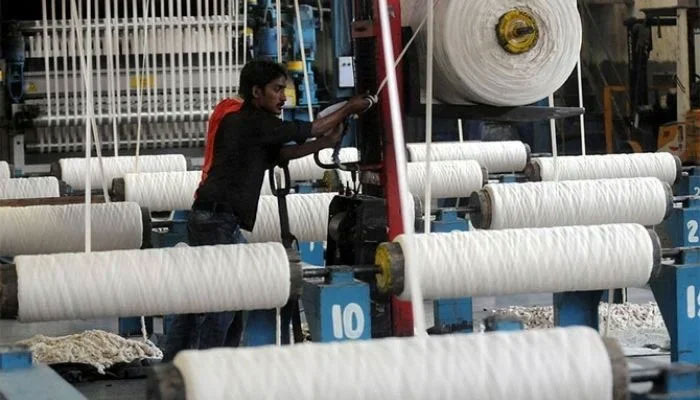Workers convention demands end to contractual employment practices
Factory workers and home-based women workers converged on Monday at the Textile Garment Workers' Convention in Godhra Colony and demanded improved working conditions and respect for their rights.
Organised by the National Trade Union Federation (NTUF) and Home-Based Women Workers Federation (HBWWF), the convention saw participation of workers from various factories and home-based industries in New Karachi, North Karachi and Federal B Area industrial zones.
A nine-member organising committee was elected during the convention, tasked with advocating for the workers rights at different platforms. The convention demanded issuance of appointment letters to all the workers to their ensure job security and transparency in employment terms.
It added that worker should be paid wages through bank accounts for their financial inclusion and elimination of potential discrepancies in salaries disbursement. It demanded that all the workers be registered with the social security and pension institutions for their and their families’ financial security.
It added that all forms of contract systems should be abolished and standard employment practices put in place to prevent labour exploitation. The labour rights activists demanded that the government and authorities ensure eight-hour workday with weekly paid holidays for all workers and promote work-life balance culture.
They added that double pay should be paid for overtime work and workplaces made safer to prevent loss of lives in case of accidents. The convention demanded an end to discrimination against women workers, and equal treatment and opportunities for people belonging to all genders.
It added that workplaces should be made harassment-free to ensure a dignified and respectful work environment for all. It demanded effective implementation of labour laws to guarantee that the workers' rights were upheld as per the national and international regulations.
It added that the garment and textile industry should adopt ethical and responsible employment and sourcing practices respecting global agreements between brands and unions. It demanded extension of full labour rights to home-based workers for equal protection and benefits for the often-marginalised workforce.
-
 Prince William 'worst Nightmare' Becomes Reality
Prince William 'worst Nightmare' Becomes Reality -
 Thai School Shooting: Gunman Opened Fire At School In Southern Thailand Holding Teachers, Students Hostage
Thai School Shooting: Gunman Opened Fire At School In Southern Thailand Holding Teachers, Students Hostage -
 Britain's Chief Prosecutor Breaks Silence After King Charles Vows To Answer All Andrew Questions
Britain's Chief Prosecutor Breaks Silence After King Charles Vows To Answer All Andrew Questions -
 Maxwell Could Get 'shot In The Back Of The Head' If Released: US Congressman
Maxwell Could Get 'shot In The Back Of The Head' If Released: US Congressman -
 New EU Strategy Aims To Curb Threat Of Malicious Drones
New EU Strategy Aims To Curb Threat Of Malicious Drones -
 Halle Berry On How 3 Previous Marriages Shaped Van Hunt Romance
Halle Berry On How 3 Previous Marriages Shaped Van Hunt Romance -
 Facebook Rolls Out AI Animated Profile Pictures And New Creative Tools
Facebook Rolls Out AI Animated Profile Pictures And New Creative Tools -
 NHS Warning To Staff On ‘discouraging First Cousin Marriage’: Is It Medically Justified?
NHS Warning To Staff On ‘discouraging First Cousin Marriage’: Is It Medically Justified? -
 Andrew Mountbatten-Windsor Flew Money In Suitcases To Launder: New Allegation Drops
Andrew Mountbatten-Windsor Flew Money In Suitcases To Launder: New Allegation Drops -
 Nancy Guthrie Abduction: Piers Morgan Reacts To 'massive Breakthrough' In Baffling Case
Nancy Guthrie Abduction: Piers Morgan Reacts To 'massive Breakthrough' In Baffling Case -
 Will Warner Bros Finalize Deal With Paramount Or Stays Loyal With Netflix's Offer?
Will Warner Bros Finalize Deal With Paramount Or Stays Loyal With Netflix's Offer? -
 Adam Mosseri Set To Testify In Court Over Social Media Addiction Claims
Adam Mosseri Set To Testify In Court Over Social Media Addiction Claims -
 Palace Spotlights Queen Camilla For Her Work With Vision-impaired Children A Day After Andrew Statement
Palace Spotlights Queen Camilla For Her Work With Vision-impaired Children A Day After Andrew Statement -
 Kim Kardashian Still 'very Angry' At Meghan Markle, Prince Harry
Kim Kardashian Still 'very Angry' At Meghan Markle, Prince Harry -
 Texas Father Guns Down Daughter After Heated Trump Argument
Texas Father Guns Down Daughter After Heated Trump Argument -
 Andrew, Sarah Ferguson Quietly Adopts New Strategy To Control Public Narrative
Andrew, Sarah Ferguson Quietly Adopts New Strategy To Control Public Narrative




